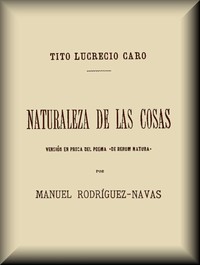Naturaleza de las cosas: Versión en prosa del poema «De rerum natura»
"Naturaleza de las cosas: Versión en prosa del poema «De rerum natura»" by Manuel Rodríguez-Navas is a philosophical treatise written in the late 19th century. This work serves as a prose version of the ancient Roman poet Lucretius's epic poem, which endeavors to explore the nature of the universe, the essence of the material world, and the principles of Epicurean philosophy. The text delves into topics such as the atomic theory, the
rejection of superstition, and the pursuit of knowledge, aiming to dispel fears associated with life and death. The opening of the text introduces the reader to Lucretius’s fundamental ideas, highlighting the beauty and complexity of the natural world. It discusses the influence of Venus, the goddess embodying love and fertility, who symbolizes the life force in nature. Lucretius appeals to his friend Memmius, expressing the importance of seeking the truth about existence and encouraging an inquiry into the universe's fundamental elements. The beginning establishes a philosophical groundwork for the exploration of nature's laws and aims to combat societal superstition and ignorance through reasoned understanding. (This is an automatically generated summary.)
Read now or download (free!)
| Choose how to read this book | Url | Size | ||||
|---|---|---|---|---|---|---|
| Read online (web) | https://sendtokindle.compellingsciencefiction.com/ebooks/62711.html.images | 525 kB | ||||
| EPUB3 (E-readers incl. Send-to-Kindle) | https://sendtokindle.compellingsciencefiction.com/ebooks/62711.epub3.images | 253 kB |
Send
to kindle email: |
|||
| EPUB (no images, older E-readers) | https://sendtokindle.compellingsciencefiction.com/ebooks/62711.epub.noimages | 255 kB | ||||
| Kindle | https://sendtokindle.compellingsciencefiction.com/ebooks/62711.kf8.images | 386 kB | ||||
| older Kindles | https://sendtokindle.compellingsciencefiction.com/ebooks/62711.kindle.images | 351 kB | ||||
| Plain Text UTF-8 | https://sendtokindle.compellingsciencefiction.com/ebooks/62711.txt.utf-8 | 467 kB | ||||
| Download HTML (zip) | https://www.gutenberg.org/cache/epub/62711/pg62711-h.zip | 223 kB | ||||
| There may be more files related to this item. | ||||||
About this eBook
| Adapter | Lucrecio Caro, Tito |
|---|---|
| Translator | Rodríguez-Navas, Manuel, 1848-1922 |
| Title | Naturaleza de las cosas: Versión en prosa del poema «De rerum natura» |
| Note | Reading ease score: 26.7 (College graduate level). Very difficult to read. |
| Credits |
Produced by Ramón Pajares Box and the Online Distributed
Proofreading Team at https: //www.pgdp.net. (This file was produced from images generously made available by Biblioteca Digital Hispánica/Biblioteca Nacional de España.) |
| Language | Spanish |
| LoC Class | PA: Language and Literatures: Classical Languages and Literature |
| Subject | Philosophy, Ancient |
| Subject | Didactic poetry, Latin -- Adaptations |
| Category | Text |
| EBook-No. | 62711 |
| Release Date | Jul 20, 2020 |
| Copyright Status | Public domain in the USA. |
| Downloads | 193 downloads in the last 30 days. |
| Project Gutenberg eBooks are always free! | |

